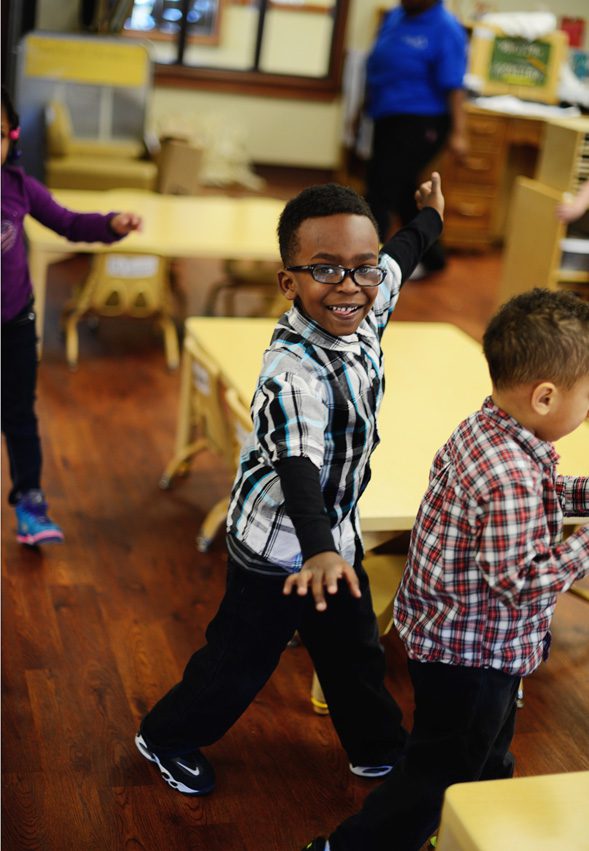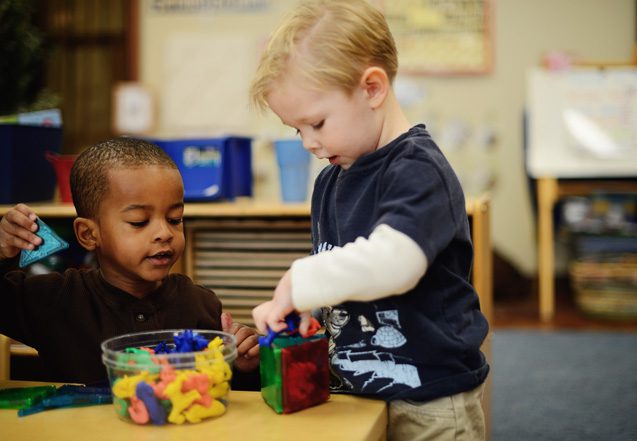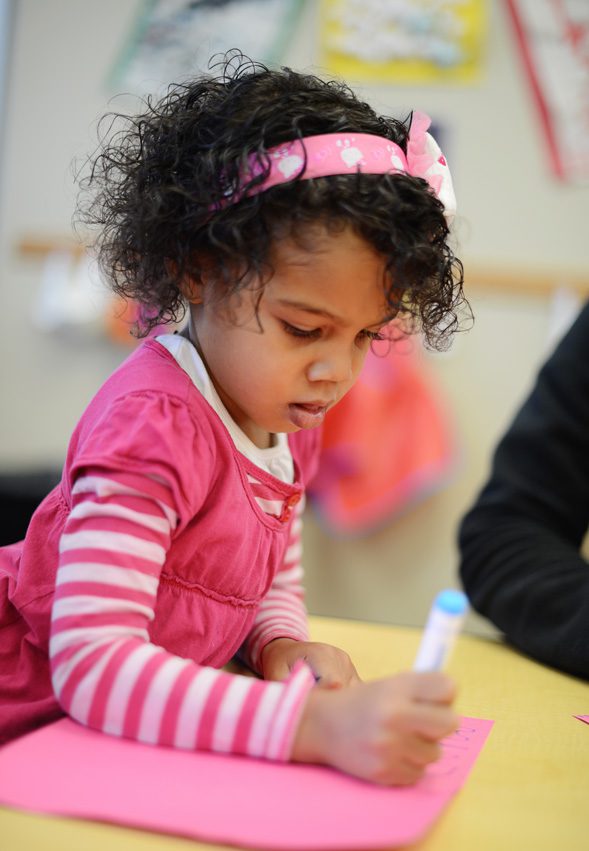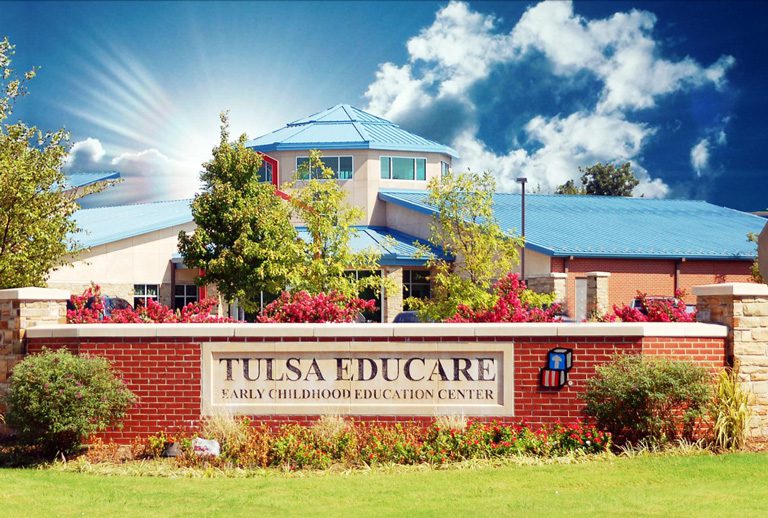
“It is easier to build strong children than to repair broken men,” Frederick Douglass said more than a century ago.
Unfortunately, society has not learned this lesson, as federal and state funds for prisons continue to rise at the same time they continue to fall for education.
However, Tulsa is leading the way in answering the call to a much-needed focus on early childhood development with Tulsa Educare, a program formed in 2004 that now includes three Tulsa public schools and reaches at least 530 at-risk children and their families.[pullquote]Educare’s ultimate goal is to break the cycle of poverty that exists in low-income families and neighborhoods.[/pullquote]
Tulsa Educare is a program with a message that learning begins at birth and that education is the great American equalizer. The program relies heavily on research and evaluation of its methods and outcomes; the program also brings understanding to the association between poverty and gaps in educational achievement.
The achievement gap is precisely what motivated the founding organizers of Educare in 2003, when the Buffett Early Childhood Fund and the Ounce of Prevention Fund teamed up to begin the nationwide program.
“Tulsa is a community invested in early childhood and understands the importance that it has for the future of our next generation,” says Tulsa Educare executive director Caren Calhoun.
That investment in Tulsa’s children is obvious when looking at the location of the 21 Educare programs throughout the United States, with Tulsa having more sites than any other city. Tulsa’s three Educare programs are located at Kendall-Whittier, Hawthorne and MacArthur, three elementary schools in neighborhoods of at-risk children.[pullquote]A key to the success of the Tulsa Educare program is its partnerships – with other agencies, parents, schools and the communities in which the schools operate.[/pullquote]
The Educare model involves a full-day, year-round program that includes children as young as six weeks. Children stay in the program until they enter elementary school. The program’s goal is to work with the community’s children most vulnerable to poverty, provide instruction and nurture parent-child relationships ensuring the greatest chances for success in life. Its ultimate goal is to break the cycle of poverty that exists in low-income families and neighborhoods.
Calhoun, who has worked with children under the age of 4 since she herself was 16, ran the Head Start program for the Community Action Project of Tulsa County for 10 years and was a National Head Start Fellow for a year. This background explains her enthusiasm for the innovative program, which allows children to have the same teacher for several years in a row, quality meals, one-on-one interaction and extended hours of care throughout the day and the year.
“Even with all of the research about the long-term advantages of quality early education programs, I’m not sure that everyone understands that the achievement gap manifests as early as 18 months, and most children continue to lag behind throughout school,” Calhoun says.

In fact, research has repeatedly shown that such elements as cognitive and socializing functions must be in place by age 3, or a child will likely be continually behind in development.
A key to the success of the Tulsa Educare program is its partnerships – with other agencies, parents, schools and the communities in which the schools operate. Tulsa Educare is made possible by federal and state funds, private sources, such as the George Kaiser Family Foundation, and programs at the University of Oklahoma and Oklahoma State University.
Diane Horm, the director of the Early Childhood Education Institute (ECEI) at OU-Tulsa, says her research has shown that children who enter the Educare program as infants or toddlers start kindergarten performing similar in school readiness and social and emotional development to their same-age peers who don’t live in poverty.
In other words, Horm explains, “Early enrollment, as an infant or toddler in Educare, appears to prevent the achievement gap from forming.”
Lead By Example
Kasondra Gunnels’ children have been a part of Educare since 2010. The program was not available at Kendall-Whittier when her oldest son, RoyLee, 12, was younger, but her two daughters have experienced it.
Gunnels says she loved that Educare is “so much hands-on” and that her girls KayLee, 7, and Zoe, 2, love to read and be read to.
“Zoe has really benefitted from the program,” Gunnels says. “I am so amazed by her because each day she teaches me something new and mind-blowing. Her teacher and I speak every day about her progress, and Zoe seems so advanced for her age. It is truly a blessing to have this program available.”
Gunnels also thinks her children have benefited from the diversity of their peers.
“The different cultures they have the pleasure of being exposed to – they enjoy knowing they have friends that know how to speak other languages, and they can pick up on some of their friends’ words,” she says.
The personal feelings of enrichment that Educare has created are also bolstered by data, whose use, Horm says, is “an emerging area of work in early childhood education.”
Horm says that ECEI has worked closely with Tulsa Educare doing research since 2006, and the results are something Horm, along with several colleagues, recently published in Early Education and Development.
“The implementation of … the collection, analysis and use of data to track child progress and to inform program improvement – distinguishes Educare from other early care and education program models,” the journal article notes.
Much of Educare’s success is based on partnerships, which is where OU comes in, by assessing the Educare program and providing feedback. This feedback, in the form of data, is the focus of Horm’s work and ensures that Educare teachers have quality information that helps them meet and exceed the program’s goals.
While many teachers are familiar with a flawed evaluation process that provides little meaningful information, the partnership between ECEI and OU is trying to ensure that while assessment is rigorous and ongoing, it is done with mutual respect, training and relationship-building between assessors and teachers.
In fact, not only is Tulsa Educare leading the way for early childhood program possibilities, but ECEI is doing some groundbreaking work in research.
“Our work is contributing to and advancing the professional literature in early childhood education,” Horm says.
Research shows that children from high-risk populations, such as those that the Tulsa Educare program serves, typically score well below the national average and are usually several months behind, developmentally, their more advantaged peers. But after experiencing the Educare program, the children show they are on the same level or above that of their more advantaged peers.

Educare In Action
The Educare model is one that emphasizes key areas of school readiness, vocabulary, social and emotional skills and classroom quality.
Calhoun notes that these areas are addressed by forming relationships with the parents.
“Parents are encouraged to become a member of the Educare Policy Council to share in agency decision making and empower them as leaders,” Calhoun says.
Each family with children in Educare is assigned a family advocate who helps the family with medical issues, school readiness and goal setting.
“Educare believes that the engagement of families is a large determinant in the child’s future achievements,” Calhoun says.
School readiness and health are partially addressed through providing families with medical resources, along with a vision, hearing, height and weight screening for each child.
This comprehensive, interdisciplinary approach to meeting a child’s and family’s needs is a unique element of Educare, along with its use of data to guide instruction and to work toward continual improvement. Not surprisingly, the classroom educational model is quite different from a traditional public school setting.
Each classroom has a teacher with a bachelor’s degree supported by a coach that holds a master’s degree. In addition, according to Calhoun, “Each child is placed in a multi-age classroom and assigned a primary caregiver. They remain in this safe, trusting environment with the same teaching team for up to three years to allow for a continuity of care and minimal transitions.”
Calhoun adds that Educare’s model uses a “comprehensive and intentional way to achieve academic success,” along with “an interdisciplinary approach to the child, which assists in meeting their needs in the areas of health, nutrition, mental health and early intervention services.”
Teri Cowan, a parent whose daughters attended the Kendall-Whitter Tulsa Educare program, says it was a great experience for both of them. Her daughter, Acacia, who participated in Educare for three years, is reading at a seventh-grade level and is also enrolled in the gifted and talented program, she says.
“I attribute that to the wonderful teachers at Educare,” Cowan adds.
Her younger daughter, Trinity, was enrolled in the Educare home-based program.
“It was wonderful. We had a teacher come out to our house once a week for an hour and a half, and Trinity was learning what the other children were learning at the home base,” she says.
Cowan, who spent two years as a policy council representative with Educare, was also elected a community representative and was part of a committee that wrote and received a grant for a program called Beyond the Walls.
Beyond the Walls is a program that began in 2014 to provide opportunities and experiences for children not enrolled in quality early childhood education programs. Tulsa Educare collaborates with local agencies to ensure that children and parents are supported in early learning opportunities.
Some of the Beyond the Walls programs include Reach Out and Read, which trains medical professionals to address the importance of reading aloud to children during doctor visits; Talking is Teaching, which encourages Tulsans to read, talk and sing to young children; and HappyFeet, which provides 2- and 3-year-olds a parent-child program through sports combined with stories and rhymes.
“Acacia and Trinity loved [HappyFeet] so much that they were excited to go to school every day,” she says.
Cowan’s daughters, both graduates of Educare, are now in regular public school classrooms.
“The most memorable thing about Educare was being a part of the policy council, because I was getting to be a part of making the school better and helping to find ways to improve the early childhood program,” Cowan says. “For me, that will always be something I remember.
“Today, I’ve been asked to join a parent ambassador group, and we’re focusing on more ways to get people involved in their kids’ education and to bring about parent engagement in that,” she adds.























